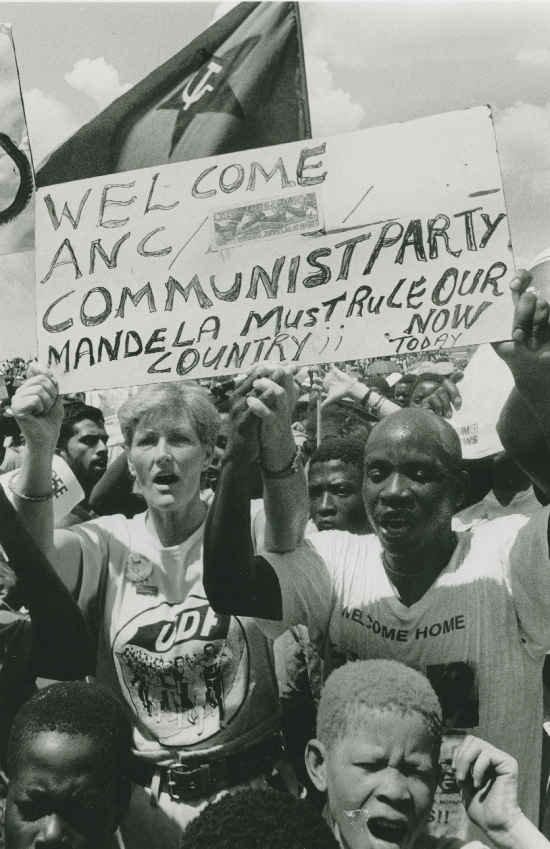Precisely twenty years after the unbanning of the African National Congress (ANC), the South African Communist Party (SACP) and the Pan African Congress (PAC), SAHA reflects on the significant parliamentary declaration made by South African President F.W. De Klerk, which also included the release of political prisoners and the partial lifting of the State of Emergency. This declaration is perhaps one of the most important moments in the pre-history of democratic South Africa.
Responses to the State President's concessionary stance echoed a speech given by exiled ANC leader Steve Tshwete in 1987 at a public meeting in Harare about the need for all South Africans to forge a collective struggle against the burgeoning apartheid state:
"...when Botha comes to realize that he has problems with the white community in South Africa... when he comes to realize that apartheid is not only unworkable as a result of black resistance, but to a very large extent the white community is playing a role in rendering apartheid unworkable...only then... he will find it necessary for him...to make the correct move in the right direction."
With its unbanning, the ANC began its ideological transition from a struggle movement to a political party. It entered into negotiations with the NP-led government in 1991, and by April of that year, five white Members of Parliament representing the Democratic Party (DP) left their party to join the ANC. This amounted to the first-ever representation of the ANC in South African parliament. The unbanning was effectively brought about by removing these political parties from the 4th Schedule of the Internal Security Act (Act No. 74 of 1982). Another amendment of Section 16 (6)(b) of the same Act effectively removed the names of banned persons from a consolidated list contained in the Act. The list included over 100 names, including Bram Fischer, Matthew Goniwe, Govan Mbeki, Hilda Bernstein, Fort Calata, Yusuf Dadoo, Helen Joseph, Mary Turok, Albie Sachs, Joe Slovo and Archie Sibeko. It neither removed the Act nor secured the safety of unbanned persons, who could still be arrested under the State of Emergency Regulations. At the time, the changes were slow, with no certainty of what was to come. Responding to De Klerk's pronouncement, the UDF released a press statement on the same day conceding "the boldness of some of the steps," but saw these as merely preliminary. It appealed to its member organisations "to intensify the struggle on all fronts." The UDF also argued that as long as laws such as the Internal Security Act, the Group Areas Act and the Land Act remained in place, apartheid would "continue to bedevil political relations in this country."
Over the course of the next few years, which have since become known as the 'interregnum' period of South African transition, the ANC engaged in successful negotiations with the NP-led government. It successfully recreated itself during this time, emerging victorious during South Africa's first democratic election on the 27th of April, 1994.

Welcoming the ANC and SACP. From the SAHA Original Photograph Collection
SAHA's archival collections contain a fortune of information related to the many struggles against apartheid. For more information on the experience of those who were banned or exiled:
AL2461: SAHA Exiles Project
AL3027: Barbara Harmel Collection
AL2984: Tucker Foundation Oral History Project
For more on the United Democratic Front and its role in the struggle, please see one of SAHA's numerous collections rooted in the UDF. Reflecting SAHA's history as an archive established by UDF affiliates, SAHA has a significant range of UDF materials, including documents, posters, photographs and ephemera in its archive. Some of these include:
AL2431: The United Democratic Front (UDF) Collection
AL2446: SAHA Poster Collection
AL2457: Original SAHA Collection
AL2460: The Julie Frederikse Collection
AL2547: The SAHA Original Photograph Collection
For the original proclamation please see the Government Gazette, No. 12287, 3 February, 1990 at the Government Publications Room situated in the William Cullen Library.
Contact SAHA.





